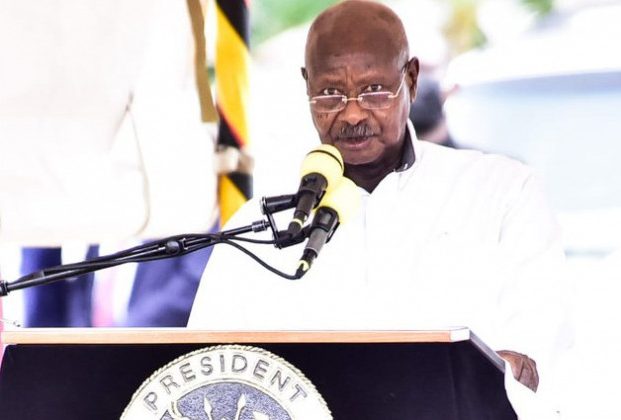KAMPALA, UGANDA: President Yoweri Museveni has fired back at the European Union (EU) parliament over its proposed move to block the setup of the East African Crude Oil Pipeline (EACOP) saying Uganda will look for another oil company if Total Energies decides to abandon its plans to fulfil its promise as signed in the agreement.
Museveni’s remarks came shortly after the Ugandan parliament in a Friday sitting scoffed back at the EU parliament with the Deputy Speaker of Parliament Thomas Tayebwa condemning their resolution as uninformed, racial and based on hearsay.
Mr. Museveni hailed the Deputy Speaker’s comments and those of the Attorney General as their reassured Ugandans of the multi-billion oil project that will benefit the population when the country starts producing its own oil by 2025.
“The remarks of the Deputy Speaker and the Attorney General in one of the dailies concerning the EU Parliament and EACOP interested me in making some comments of reassurance to our people,” Mr. Museveni said in a tweet on Friday evening.
“If they choose to listen to the EU Parliament, we shall find someone else to work with. I want to assure you that the project shall proceed as stipulated in the contract we have with TotalEnergies and CNOOC,” Museveni emphasized.
The President assured that come what may, Uganda is ready to have its own oil production by 2025 as planned before, and therefore the pressure from the EU parliament will not cause panic in the project implementation.
“Either way, we shall have our oil coming out by 2025 as planned. So, the people of Uganda should not worry.
Background
On Thursday, the EU Parliament adopted an urgent resolution denouncing the human rights violations as well as the major environmental and climate risks posed by the Tilenga and EACOP projects, developed by Total in Uganda and Tanzania.
Observers say the resolution could deter lenders from funding the oil project which is expected to attract billions of dollars into the economy and create over 300,000 jobs.
The EU legislators also asked to “put an end to the extractive activities in protected and sensitive ecosystems, including the shores of Lake Albert”, referring to the 132 wells that Total plans to dig into the Murchison Falls National Park, a protected area, and to the numerous protected ecosystems which the 50°C heated EACOP pipeline will cross.
Quoting the International Energy Agency’s 2021 report, they also recall that to have a chance to limit global warming to 1,5°C, no new oil extraction project should be developed.
While responding to the resolution passed by the EU parliament, the Deputy Speaker of Parliament Thomas Tayebwa condemned the decision saying the EU is uniformed, acting racial and based on hearsay to meddle in the country’s affairs.
“The propaganda largely targets the 1445 kilometer East African Crude Oil Pipeline, which will run for 296 kilometers in Uganda. The EACOP represents less than 0.1% of the operational global pipeline network of 1.18million Kilometres,” said Tayebwa.
“It is imprudent to say that Uganda’s oil projects will exacerbate climate change, yet it is a fact that the EU block with only 10% of the world’s population is responsible for 25% of global emissions, and Africa with 20% of the world’s population is responsible for 3% of emissions. The EU and other western countries are historically responsible for climate change. Who then should stop or slow down on development of natural resources? Certainly not Africa or Uganda,” he wondered.
Tayebwa said over 70% of the persons affected by land acquisition for the projects have been compensated or resettled and are undergoing livelihood improvement projects in agriculture, financial literacy, and vocational skills, among others.
Total Energies SE, a giant oil and gas multinational, represents the interests of the French government.
Total Energies EP as a subsidiary of the French giant is developing oil fields in Nwoya and Buliisa Districts while another subsidiary; Total Holdings International B.V holds 62 percent share in the EACOP holding company.
The EACOP will run 1,443km from the oil fields in Hoima in mid-western Uganda to the Indian Ocean Tanga Port in Tanzania.
The Uganda pipeline sections stretch for 296km in 10 districts while the Tanzania section runs for 1,147km through 25 districts and eight regions.
If you would like your article/opinion to be published on Uganda’s most authoritative news platform, send your submission on: [email protected]. You can also follow DailyExpress on WhatsApp and on Twitter (X) for realtime updates.



